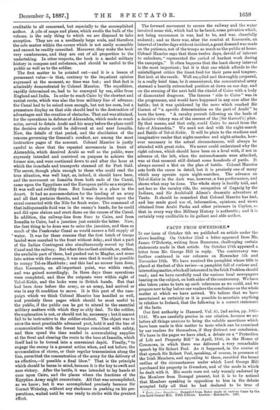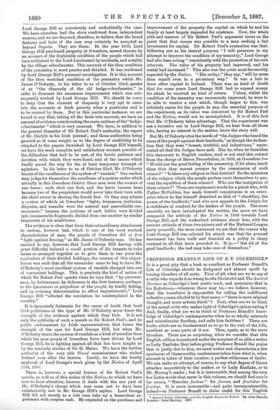FACTS FROM GWEEDORE.• IN our issue of October 8th we
published an article under the above heading. On October 22nd a letter appeared from Mr. James O'Doherty, writing from Bunerana, challenging certain statements made in that article. On October 29th appeared a letter from Mr. George Hill in reply. The controversy was farther continued in our columns on November 5th and November 19th. We have received the pamphlet whose title is placed at the foot of this review—a pamphlet fall of curious and interesting matter,which all interested in the Irish Problem should. read ; and we have carefully read the various local newspapers bearing on the subject, on both sides of the controversy. We have also taken pains to turn up such references as we could, and we propose now to lay before our readers the conclusions on the whole matter at which we have arrived. We believe that we have ascertained as certainly as it is possible to ascertain anything in relation to Ireland, that the following is a correct statement of the facts.
Our first authority is Hansard, Vol. 85, 2nd series, pp. 1085- 1142. We are carefully precise in our citation, because we are before all things anxious to bring the voluble assertions which have been made in this matter to tests which can be examined by our readers for themselves, if they distrust our conclusion. We have in the pages we have cited, a debate on a "Protection of Life and Property Bill" in April, 1846, in the House of Commons, in which there was delivered a very remarkable speech by Sir Robert Peel. As it happened, in the course of that speech Sir Robert Peel, speaking, of course, in presence of the Irish Members, and appealing to them, recorded the broad outline of the circumstances under which Lord George Hill purchased his property in Gweedore, and of the mode in which he dealt with it. His words were not only warmly endorsed by the Members from Donegal present, but it is to be noticed that Members speaking in opposition to him in the debate accepted fatly all that he had declared to be true of
• Facts from Gireedo,e. Compiled from Notes made at various times by the late Lord George HIlL Fifth Maori. London Hatokards. LBW.
Lord George Hill as notoriously and undoubtedly the case.
We have ourselves had the story confirmed from independent sources, and we are disposed, therefore, to believe that the broad features and facts of the case may certainly be accepted as beyond dispute. They are these. In the year 1838, Lord George Hill purchased property at Gweedore, moved thereto by an account of the deplorable condition of the people which had been addressed to the Lord-Lieutenant by residents, and notably by the village schoolmaster. This account of the then condition of the peasantry is most precise and detailed. It was confirmed by Lord George Hill's personal investigation. It is this account of the then wretched condition of the peasantry which Mr. James O'Doherty, in his letter to us of October 22nd, speaks of as "the rhapsody of the old hedge-schoolmaster," in order to discount the enormous improvement which was sub- sequently worked by Lord George Hill. We should be sorry to deny that the element of rhapsody is very apt to enter into the accounts of Irish poverty when a particular end is to be secured by them. But in this particular instance, we are bound to say that, taking all the facts into account, we have an amount of evidence corroborating the main outlines of the" hedge. schoolmaster" which is very unusual. We have, in addition to the general character of Sir Robert Peel's authority, the report of Mr. Carlyle in his Irish journal; and those authorities being granted as of some weight as to the degree of credibility to be attached to the papers furnished by Lord George Hill himself, we have the most complete and satisfactory account possible of the difficulties that had, to be met, of the heroic patience and devotion with which they were faced, and of the causes which finally paved the way for the at least temporary triumph of agitators. In his letter to us of October 22nd, Mr. O'Doherty boasts of the excellences of the system of "rundale." Our readers may judge for themselves the excellence of a system under which actually in this Gweedore district three men were the owners of one horse ; each shod one foot, and the horse became lame because two of the proprietors would never take their turn with the third owner in shoeing the fourth foot. Or they may admire a system of which at Gweedore "fights, trespasses, confusion, disputes, and assaults were the natural and unavoidable con- sequences," because the portions of each holder were divided into innumerable fragments divided from one another by similar fragments of his neighbours.
The evidence is clear that from that extraordinary attachment to custom, however bad, which is one of the most marked characteristics of man, the people of Gweedore did at first "fight against fencing," as Mr. James O'Doherty says. He has omitted to say, however, that Lord George Hill having with great difficulty induced a small portion of his tenants to take farms so arranged together as to give them in one piece the equivalent of their divided holdings, the success of this object- lesson was such that all the remainder came to beg to have Mr. O'Doherty's most excellent system of rundale changed into one of convenient holdings. This is precisely the kind of action of which Sir Robert Peel speaks when he says that, "by persever- ance, by forbearance, by deference in the first instance, perhaps, to the ignorances or prejudices of the people, by kindly feeling, and by evincing determination to effect improvements," Lord George Hill "effected the revolution he contemplated in the country."
It is immensely fortunate for the cause of truth that local Irish politicians of the type of Mr. O'Doherty never know the strength of the evidence against which they kick. It is not only the publicity of such a speech as Sir Robert Peel's, and its public endorsement by Irish representatives, that forms the strength of the case for Lord George Hill, but when Mr. O'Doherty treats the system of rundale as a kind of paradise from which the poor people of Gweedore have been driven by Lord George Hill, he is fighting against all that has been taught us by the masterly studies of Sir H. Maine. We have the further authority of the very able Times' commissioner who visited Ireland soon after the famine. Lastly, we have the hearty approval of Lord George's work given by the Nation of April 2t,th, 1846.
There is, however, a special feature of Sir Robert Peel's speech, as well as of this notice of the Nation, to which we have now to draw attention, because it deals with the one part of Mr. O'Doherty's charge which may seem not to have been .satisfactorily met in Mr. George Hill's replies. Lord George Bill did not merely as a rich man take up a benevolent ex- periment with surplus cash. He expended on the purchase and
improvement of the property the capital on which he and his family at least largely depended for existence. Now, the whole pith and marrow of Sir Robert Peel's argument turns on the point that that course was possible to a man seeking a fair investment for capital. Sir Robert Peel's contention was that, following out as his central purpose, "I will persevere in my attempt to improve the condition of my tenantry," Lord George had also been acting "consistently with the promotion of his own interests. The value of his property had improved, and his rental had increased." This also was the point most favourably regarded by the Nation. "His outlay," they say, "will be more than repaid even in a pecuniary way." It was a bait to draw other capital to Ireland. There was no kind of doubt that for some years Lord George Hill had to expend money for which he received no kind of return. Unless, whilst the condition of the tenantry was enormously improved, he were to be able to receive a rent which, though larger to him, was infinitely easier for the people to pay, the essential purpose of the experiment, as its value was conceived by Sir Robert Peel and the Nation, would not be accomplished. It is of this fact that Mr. O'Doherty takes advantage. That the experiment was not a lucrative one to Lord George Hill, we hear from all those who, having no interest in the matter, know the story well.
Bat Mr. O'Doherty cites the words of "the Judges who heard the cases of the people against their landlords," as though the declara- tion that they were "honest, truthful, and industrious," repre- sented all that the Judges have said. Has he, when he furnishes this statement to English readers, read or not read this extract from the charge of Baron Pennefather, in 1858, at Gweedore ?— " Would not the good feeling of the peasantry, if let alone, teach them that they cannot prosper by the commission of such crimes?" "Is there any religion in that district? Do the ministers of the religion which the people profess exert themselves to pre- vent the repetition of these crimes ? Who are the instigators of these crimes P" These are unpleasant words for a priest who, with Father McFadden, has made himself conspicuous in an enter- prise which he has himself described as that of "shackling the power of the landlords," and who now appeals to the Judges for a certificate of conduct for the leaders of the people. The more carefully we have investigated the matter, the more we have compared the attitude of the Nation in 1846 towards Lord George Hill, and the undoubted evidence about him, with the present attitude of these two priests and of the National League party generally, the more convinced we are that the reason why Lord George Hill was selected for attack was that the present movement has been built and founded on a policy in sharp contrast to all that have preceded it. It is,—" Get rid of the good landlords ; the bad may take care of themselves."










































 Previous page
Previous page